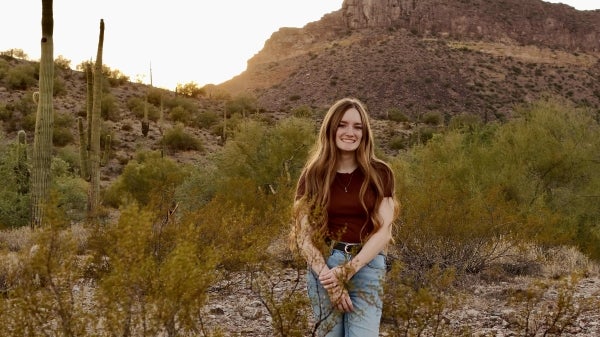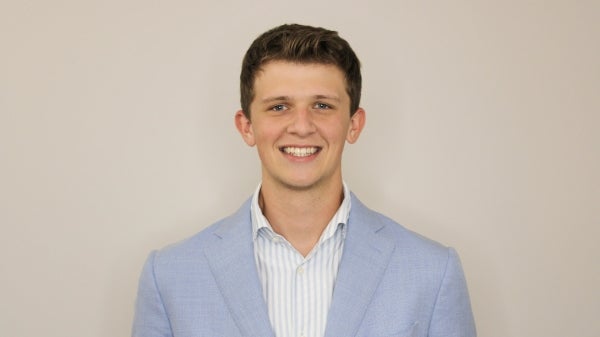Larry Fitzgerald Foundation honored with 2024 ASU MLK Jr. Community Servant-Leadership Award

Larry Fitzerald Jr. is the recipient of the 2024 ASU MLK Jr. Community Servant-Leadership Organization Award. Courtesy photo
The Larry Fitzgerald Foundation, a nonprofit organization, works to provide equitable access and new pathways for success for underrepresented communities. As the 2024 recipient of the Arizona State University MLK Jr. Community Servant-Leadership Organization awardee, the foundation will be honored with at ASU's MLK Jr. breakfast celebration on Jan. 18.
The organization was founded by Larry Fitzgerald Jr., an American former football wide receiver who played in the National Football League for 17 seasons with the Arizona Cardinals, in 2005 after losing his mother to breast cancer in 2003.
In honor of her dedication to community service and advocacy work, the Larry Fitzgerald Foundation's mission, as stated on their website, is to support youth education and breast cancer awareness, and do their part in providing access — such as creating opportunities for young people to thrive in safe and healthy environments, where they can reach their full potential. Another main part of the foundation's mission is to recognize the impact that breast cancer has on underserved communities and the lack of resouces available.
With this mission in mind, the foundation has worked for nearly two decades to provide those resources where needed, both nationally and internationally.
Here, Fitzgerald elaborates on his organization's mission and advice he has for other leaders in the community.
Question: Describe how you felt when you heard about being selected with the 2024 ASU MLK Jr. Community Servant-Leadership Award.
Answer: It was surreal. To receive the namesake honor for one of my personal heroes was an incredible feeling. The Larry Fitzgerald Foundation exists to make an impact for youth and those impacted by breast cancer, so it was a surprising and humbling moment. I also felt like my mom would have been proud, which was very meaningful to me because she was the inspiration for this work.
Q: How have your life experiences shaped you into the leader you are today?
A: I launched the foundation in 2005 in honor of my mother, Carol, who passed away from breast cancer. My mother was an incredible advocate for youth and families, and she was a founding member of the African American Breast Cancer Alliance. She was a great inspiration to me to always give back. Serving alongside her as a young man definitely helped me develop empathy for those who might be struggling. Watching her empower students or comfort someone battling cancer or AIDS gave me perspective and motivated me to use my resources and platform to help others.
Q: How does the Larry Fitzgerald Foundation project leadership in the community?
A: I like to bring people together. ... I’ve been very fortunate with this community, and I’ve received a lot of support.
In 2023, our annual Fitz’s Supper Club raised $1 million, the most to date. We are investing those resources in many different campaigns that support breast cancer and educational causes. We are committed to providing resources to organizations and nonprofits, especially in historically underserved communities year-round. We provide golf lessons in the community through (the Larry Fitzgerald Foundation) First Tee Scholarship program and our fellowship program through the Solomon Hughes Senior Golf Academy, providing life skills and helping to develop resilience and teamwork.
Q: How have you and/or the Larry Fitzgerald Foundation incorporated Dr. Martin Luther King Jr.’s values of service and inclusion in your everyday life?
A: Dr. Martin Luther King Jr.'s values of service and inclusion serve as the cornerstone of our everyday actions and decision-making. We are committed to continuing this work and upholding his legacy by striving for a more just, compassionate and inclusive world. We are intentional about reaching communities that have historically been marginalized or underrepresented with resources and support, and we aim to project positive role models for young people. Like Dr. King, we also believe we are stronger together. We approach our work through a coalition-building mindset, collaborating with individuals from all backgrounds, regardless of race, ethnicity, gender or socioeconomic status.
Q: What has been your most memorable experience or experiences of helping others?
A: I have been fortunate enough to travel around the world. There are a lot of needs, but no matter where you go or what God you worship, we all need help at certain times, and I think it’s our responsibility as human beings to lend a hand. It doesn’t matter if I'm here in the local Phoenix area or a remote village in India or Africa; it’s all the same — it's about doing your part to help humanity.
Q: Who or what keeps you inspired and motivated to serve others?
A: I’ve always kind of had an understanding that this is something that you do. You serve. That’s what I was around as a child and what I saw. I’m motivated to make the lives of others around me better and that’s what we aim to do through the foundation. What I am motivated to do the older I get is to make sure my kids, nephews and nieces see that you can be great in many different ways — but to whom much is given, much is expected. I want to leave a legacy of service.
Q: What advice would you give to future leaders about serving the community?
A: I think everyone needs to find their passion. ... Breast cancer and education might not be as important to you, but it’s important you find your passion and what you feel is important to you. If it’s not something you can resonate with, then it’s not something you will be intentional about and stick with.
More 2024 MLK Jr. awardees
Student Servant-Leadership Award: Jamelyn Ebelacker
More Sun Devil community

Crime shows led December graduate to a degree in forensics
A fascination with science, the details behind solving cases and crime-focused television shows guided Gracie Thompson to pursue forensic science studies at Arizona State University.“I grew up…

There's no stopping this global health undergraduate
If the end depends on the beginning, Esha Kubavat has set herself up for success. The Naperville, Illinois-born and Anthem, Arizona-raised undergraduate is graduating in December with a bachelor’s…

Student leader shares journey in finance and campus community
Chase Mathias first realized that the medical field might not be for him during a high school biology class when he passed out while dissecting a pig. Though he dreamed of becoming an…